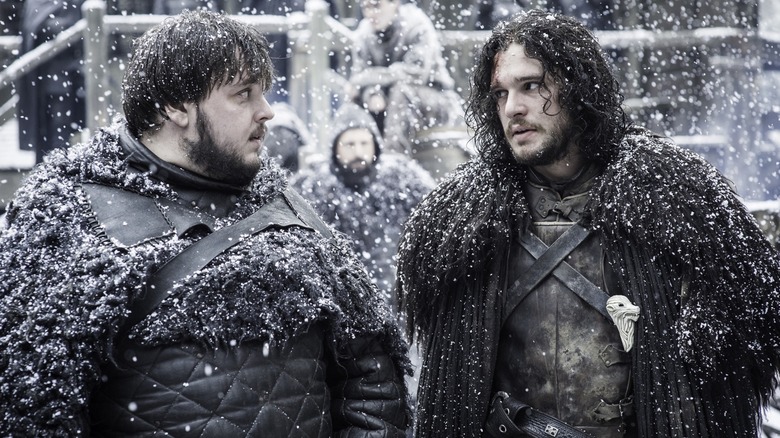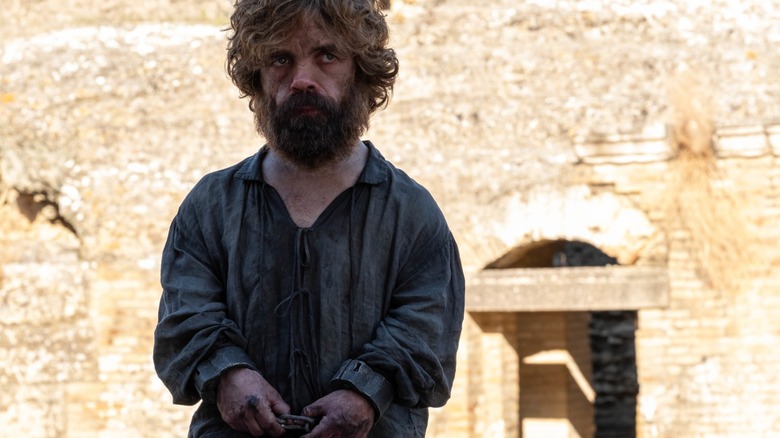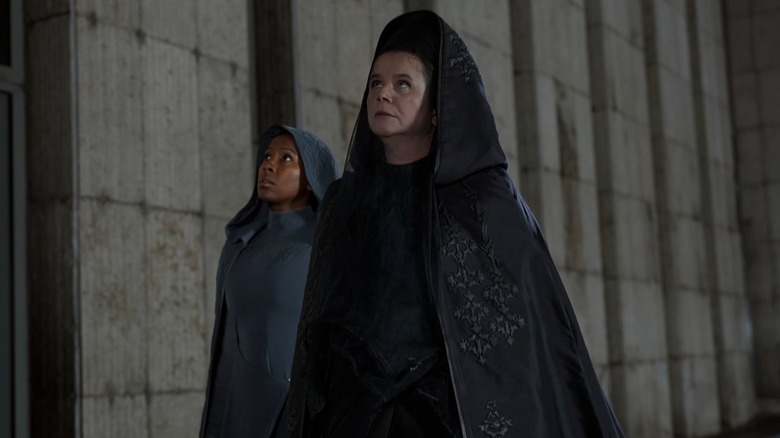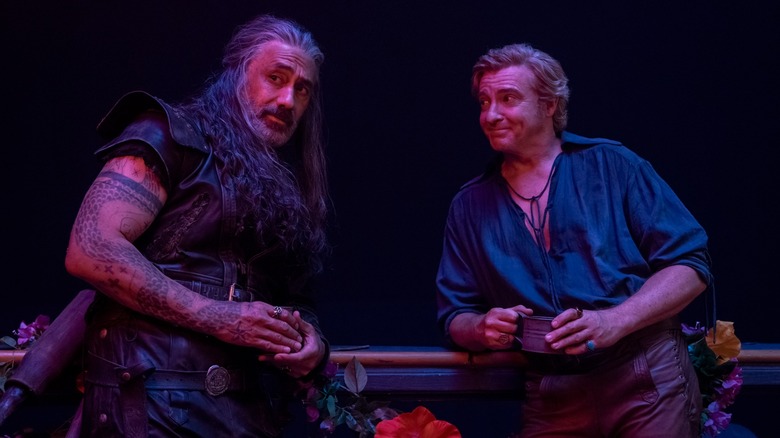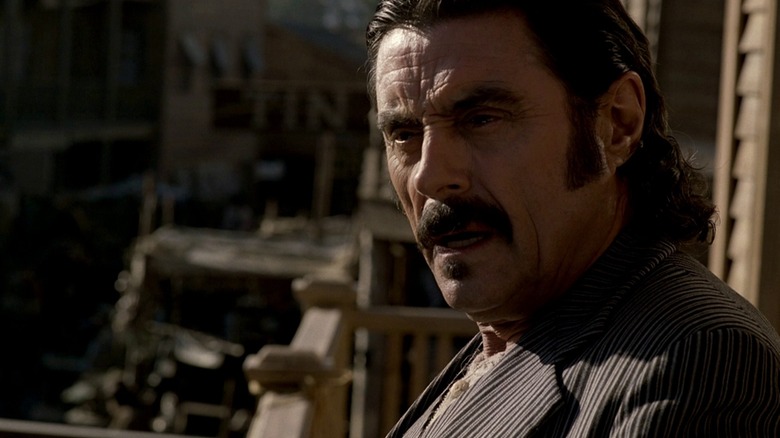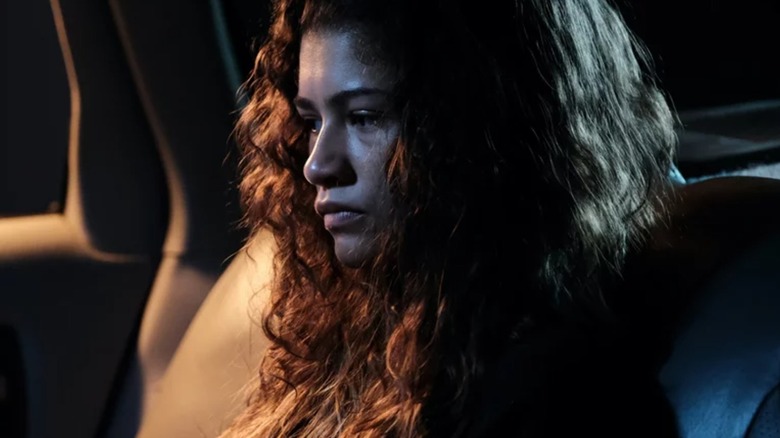HBO Can't Stop Chasing Game Of Thrones – And It's Going To Destroy Them
It's been five years since "Game of Thrones" ended, and the behemoth series still seems to be the touchstone HBO is obsessed with returning to. It makes sense that a network with a hit as big as the George R.R. Martin-inspired fantasy epic under its belt would want to replicate that series' success. "Game of Thrones" raked in more viewers than the prestige cable network had ever seen before, broke a Guinness World Record by airing in 173 countries simultaneously, and won a whopping 59 Emmys. Even with a marked quality drop in its later seasons, "Thrones" was still undoubtedly the biggest phenomenon on TV.
So why have the shows HBO has made since then, including the ones that have matched "Thrones" in ratings, failed to tap into the pop cultural zeitgeist in the same all-encompassing way? There are several factors worth considering here, from an oversaturated streaming market to a potential shift in America's interests and viewing habits to the fact that HBO's home streamer, Max, has gone through several very public identity crises and pricing restructures since it was unveiled in 2020. There's also post-"Game of Thrones" tunnel vision to consider.
HBO keeps trying to make more Game of Thrones happen
Part of the problem, it seems, is that HBO has decided to keep chasing "Game of Thrones" no matter the cost. The network famously sunk more than $30 million into a spinoff pilot that never saw the light of day, and "House of the Dragon" — the one spinoff that has made its way to primetime — literally reuses the flagship series' theme song. The network hasn't been shy about touting its various "Game of Thrones" cash grabs; by 2022, three years after "Thrones" concluded, HBO had six different spinoffs and prequels in the works. A pandemic economy, Warner Bros' merger with Discovery, and other factors no doubt forced the network to winnow down that list a bit, but just over a month ago news broke that there might be a "Game of Thrones"-related movie in the works.
HBO isn't just milking the fantasy franchise dry by pitching directly related properties. The network — like many others that witnessed the success of the swords-and-dragons series over the years — also seems to be fixated on creating shows with the explicit purpose of making them feel more than a little bit like "Game of Thrones." Shows ranging from Joss Whedon's short-lived steampunk series "The Nevers" to the Colin Farrell-led "Batman" spinoff "The Penguin" to existential sci-fi series "Westworld" (made before "Thrones" ended) have all been compared, negatively or otherwise, to "Game of Thrones" in the press.
Critics say Dune: Prophecy is the most blatant rip-off yet
The network's most recent — and most blatant — attempt to recapture the feeling of "Game of Thrones" comes via "Dune: Prophecy," a spinoff of Denis Villeneuve's gorgeous and singular ongoing film saga based on Frank Herbert's books of the same name. It's not just the tone or scope of the fantasy series that "Dune: Prophecy" seems to crib from, but its actual plot beats as well. The show comes with featurettes with names like "Great Houses Explained," and its pilot episode ends with a shocking act of violence akin to Bran being pushed from a tower window at the end of the "Thrones" pilot. The show, unsurprisingly, started its development in 2019, right as "Thrones" was ending.
"'Prophecy' traces the narrative lines of 'Game of Thrones' way too closely," Chris Revelle writes in Pajiba's review of the "Dune" offshoot. "The plotting is the same, the proclamations are the same, the beats are the same, and it gets stale quickly." Over at TVLine, Dave Nemetz writes that the new series is "too dense, too cerebral and too eager to copy 'Game of Thrones” every move." Some writers, like Entertainment Voice's Alci Rengifo, think HBO's own game plan here is clear: "HBO is clearly pinning hopes on this series filling the 'Game of Thrones' void." After reading over two-dozen "Dune: Prophecy" reviews that make note of the ways the show pulls liberally from the "Thrones" rulebook, I stopped keeping count.
Phenomenal HBO shows have been canceled in the past 5 years
In a perfect world, it wouldn't matter that execs at HBO have spent years trying to make lightning strike twice with another "Thrones"-esque series, even as the TV landscape has drastically changed shape around them. If viewers didn't like any of these new shows, well, we could just watch something else. Unfortunately, though, HBO has made several phenomenal shows in the years since "Game of Thrones" went off the air, and many have suffered from comparatively minimal marketing and what appears to their fans to be a pattern of premature cancelation.
The network has produced projects from some of the most interesting filmmakers and actors today, greenlighting a raw girl skater series ("Betty") from Crystal Moselle, a satirical, Hugh Laurie-led comedy from Armando Iannuci ("Avenue 5"), and a buzzy Stephen King adaptation starring Cynthia Erivo ("The Outsider"). All of these shows premiered in 2020, the year after "Thrones" signed off, and all of them — and many others — were axed or otherwise ended after their first or second seasons.
HBO has packed its post-"Thrones" lineup with enormous talent and artistry, from Michaela Coel's "I May Destroy You," which explored the messy boundaries of sexual trauma and its aftermath, to Luca Guadagnino's "We Are Who We Are," a beautifully shot and performed coming-of-age series, to "Winning Time," a talent-soaked if controversial riff on the LA Lakers' golden age. Over the last five years, the HBO roster has overflowed with shows that should be enduring hits that spawn future working relationships with creators and stars. Other standouts of the recent HBO era include "How To With John Wilson," "Mare of Easttown," "Perry Mason," "Lovecraft Country," and "Somebody Somewhere," plus Max titles like "Our Flag Means Death" and "Made For Love."
HBO built its legacy on original storytelling, not IP
None of those shows remind viewers the least bit of "Game of Thrones," and all of them have now ended or are in the process of ending. Those that were marketed as limited series don't seem to have produced additional collaborations between their creators and HBO, though Coel has something in the works and Guadagnino exited an HBO adaptation of Bret Easton Ellis' "The Shards" earlier this year, per The Guardian. The relationship between HBO and creators seems to have been further strained by Warner Bros. Discovery CEO David Zaslav's highly criticized decision to cut costs by scrapping high-profile, deep-in-production projects and removing exclusive titles from Max in 2023. Importantly, all of the shows mentioned above are good, great, or fantastic, and all of them deserved better than to be regarded as afterthoughts or one-hit wonders.
It's not exactly like HBO has no blueprint for making wholly original content that connects with viewers. Some of the best HBO shows of all time were one-off wonders that were very pointedly never replicated or turned into a franchise. "The Wire," "Six Feet Under," "The Sopranos," "Veep," and "Deadwood" all signed off with thoughtful, powerful conclusions after several fully-developed seasons and — with the exception of a "Sopranos" prequel and the "Deadwood" finale film — stayed gone once their initial run ended. All of them offered phenomenal viewing experiences, and they thrived on their own merits rather than on their parent company's attempts to shoehorn them into a recent hit-shaped vacancy in the zeitgeist.
HBO seems poised to keep fumbling the bag indefinitely
HBO has a few shows like that now, too. "Euphoria," "The White Lotus," the recently-ended "Succession," and "True Detective: Night Country" all pleased critics and got viewers talking, and the only success they've ever attempted to replicate is their own. These shows are proof that watercooler TV didn't die with "Game of Thrones," but even some of these standouts are not as stable as they should be. "Euphoria," a smash hit with star-filled cast, has been plagued with behind-the-scenes drama and is taking an extra-long hiatus between its second and third seasons. Mike White's rare solo writing style on "The White Lotus," meanwhile, ended up at the center of conversations about WGA rules during last year's writers' strike.
This small handful of shows gets plenty of hype from HBO, as does "House of the Dragon." But it's clear that, for the most part, the network powers-that-be are ignoring the gems they already have in favor of hacking away at the same hollowed-out spot where they struck gold half a decade ago. How much longer can this go on? Judging by HBO and Max CEO Casey Bloys' huge plans for the "Harry Potter" franchise, the network will continue to devalue some of its best titles in favor of continued attempts to build on pre-existing IP empires for the foreseeable future. Whether or not this strategy will prove as lucrative and foolproof as execs seem to think it will remains to be seen.
The company's current strategies may be best-exemplified by their inexplicable decision, in 2023, to drop the "HBO" name from their streaming service altogether. It's a strange, counter-intuitive move that's emblematic of just how gamely the once-unmatched cable network is willing to flush its reputation down the toilet — all in the desperate pursuit of a buck.
